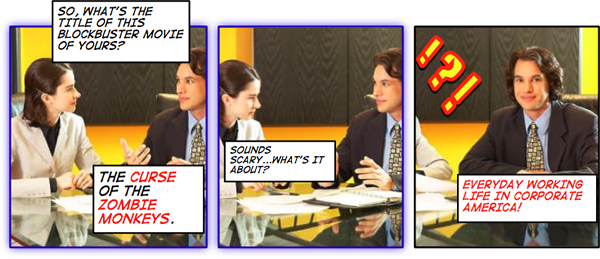Whole Foods, but not the whole truth?
Why truth matters more in business life than many currently believe.
Truthfulness is often an early casualty in the path of macho management. Such “soft” virtues as honesty and truthfulness are treated with disdain by hamburger managers, obsessed as they are with getting results and winning by any and all available means. This is a bad mistake, and one that is nearly always punished in due course.Here’s an interesting piece from yesterday’s Huffington Post on the topic of trust. The starting point is the case of the CEO of Whole Foods and his anonymous blogging that hyped his own business (and even praised his hair style) and knocked the competition.
A few short extracts will give you the flavor:
What signal does Mackey’s behavior send to Whole Foods executives and employees? That deception is practiced by their CEO and therefore an acceptable practice? What signal does this send to Whole Foods suppliers? That representations may not be what they seem?Hopefully, we are coming to an end of the tolerance given to unethical and unpleasant behavior by leaders, just as long as it “produces results.”
Stephen M.R. Covey’s important recent book The Speed of Trust: The One Thing that Changes Everything, reminds us of the business case for being trustworthy and being seen as trustworthy. Character is first among equals in leadership requirements. Reputation takes years to build and seconds to destroy.
And Thomas Friedman’s excellent op-ed piece (“The Whole World Is Watching”) underscores a new fact of life these days: your behavior, words and deeds are part of a permanent record, enabled by the internet.
Of course businesses need results: their survival depends on them. But how those results are obtained isn’t irrelevant. Business is part of life and our society. It isn’t some separate sphere with its own rules and standards, independent of the demands of a free and civilized way of living.
People have always held their leaders accountable for their behavior—eventually. It may take a while. There’s often a period when leaders are given the benefit of the doubt; or when the novelty of an approach, or the presence of a fresh face, can obscure what is going on. Yet in the end, even the most ruthless and devious leader will make some error. At that point, all the envy and dislike that has been building up tends to come out and cause a violent delight in hastening their downfall.
Truth is too precious to ignore
Truth is the basis for all civilized societies. Without knowing, truthfully, what is happening, democracy is neither effective nor, ultimately, possible.No one can be truly free if they are being kept in ignorance at the same time.
Truth is also essential to trust. Despite the faux-sophisticated sneers of macho managers and financial whiz-kids, all business depends utterly on trust. You have to believe that, in the vast majority of instances, people will honor contracts, deliver what they promised, and pay what has been agreed. Where there is no trust, every small thing has to be checked constantly; no one can be allowed to work without constant supervision; no message can be transmitted with being checked and re-checked every step of the way.
No truth = no trust = massive waste of resources
Can you imagine what all this would cost? How much every transaction would be slowed down by all the checking and auditing involved? How much time, energy, and money would go to waste on the conflicts, lawsuits, and bickering that would result? There is enough erosion of trust as it is to suggest just a tiny fraction of what would happen if trust broke down more significantly.There used to be a time when society forced business leaders to practice greater honesty and trustworthiness. Sayings like “my word is my bond” summed up the prevailing notion that dishonesty and lying were not to be tolerated among those who controlled the business world.
Of course there were rogues too. There always have been. But they weren’t praised and excused in the way that they are today. Making money was more often seen as a slightly distasteful business: an activity that had to be conducted with one hand held over the nose. To be rich through business might well not win you respect in polite society. The only way to avoid the stigma of “trade” was to be known for your absolute probity—even if it cost you some of the potential profits.
This seems quaint today, when being rich can appear to absolve you from every character flaw and sin. In reality, that isn’t true. Lying, cheating, and betraying others to enrich yourself are still, I believe, intensely distasteful to most people. The public may be dazzled for a while by fame and glamor, but it always wears off.
For long-term success, the truth isn’t just something, it’s everything
From time to time, people ask me how they can choose the right path in life; how they can avoid stress and burnout; how they can be happy.If I knew all those answers, I would be some kind of superman and I’m not. All I know are a few of the most important questions. And I know that telling and facing the truth is such an essential part of any answer to life’s problems that it’s hard to overestimate its importance.
If you don’t tell the truth, especially to yourself, you are living a lie and are so far off any sensible course that disaster seems inevitable. How can you find any answers to the problems of your life if you won’t be truthful about them, even to yourself? How can you get people to help you if you lie to them?
If you won’t face the truth, you’re a fool. You may be able to convince yourself of your deceptions and evasions. You may be able to convince other people too, at least for a time. But you can never, never, deceive reality. Try all you want, reality will proceed on the basis of a strict adherence to the facts. It will treat your fantasies with contempt and you with impersonal accuracy. All you will have done is compound any problems by closing your eyes and letting them come at you out of the dark.
Whether what the CEO of Whole Foods did was malicious or just foolish is almost beside the point. What really matters is that so many leaders believe that deceptive actions and suppression of the truth are acceptable. That’s the thing to worry about.
When our leaders become ethically blind, they ought to forfeit the right to lead. It’s up to all of us to enforce that law, before the universe enforces it for us.
Labels: business ethics, Hamburger Management, leadership, trust











